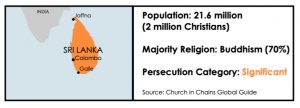
Sri Lanka, known as Ceylon until 1972, is an island in the Indian Ocean that gained independence from Britain in 1948. It suffered over 25 years of civil war (1983-2009) between the mainly Buddhist Sinhalese majority and the mainly Hindu minority Tamils, which ended when the government crushed the Tamil Tiger separatists. The country has also experienced serious natural disasters such as the 2004 tsunami.
Sri Lanka is officially a secular state, but Buddhism is recognised as the state religion – the Constitution states: “The Republic of Sri Lanka shall give to Buddhism the foremost place and accordingly it shall be the duty of the State to protect and foster the Buddha Sasana [teachings of the Buddha]” – and radical Buddhist movements are stirring up ethnic, political and religious tensions. Christians displaced by natural disasters are often afraid to seek shelter in relief camps due to fear of Buddhist hostility.
The Constitution guarantees freedom for other religions, but in practice followers of minority religions face discrimination. Hindus comprise about 12% of the population, Muslims 9% and Christians 8%, of whom around eighty per cent are Roman Catholics, a legacy of Portugal’s colonial influence.
Christians in Sri Lanka
Christianity, introduced by the Portuguese in the 16th century, is still considered a foreign religion and converts are seen as traitors and face threats and attacks. Muslims also face persecution.
Traditional churches are generally tolerated, but newer churches are sometimes attacked by radical Buddhist mobs or local government officials angered by the increasing number of Evangelicals and Pentecostals and many pastors have been beaten, threatened and detained. A government circular introduced in 2008 requires places of worship to be registered, although there is no legal basis for registration. The directive is used not only on new buildings but on places where Christians have met for many years, and many “unregistered” churches have been closed.
Buddhist monks are very influential in rural areas and sometimes incite large mobs to attack Christians and churches and also Muslim businesses and mosques, with police and local officials often complicit.
Bodu Bala Sena or “Buddhist Power Force” is believed to be behind most attacks on minorities. A Sinhalese Buddhist nationalist organisation, it formed in Colombo in July 2012 when Buddhist monks broke away from the Jathika Hela Urumaya (National Heritage) party, saying it was not sufficiently militant in protecting Buddhism.
Persecution of Christians has escalated since 2012, including mob attacks on churches, state-sanctioned church closures, personal attacks, arson, vandalism, intimidation and discrimination (notably in relation to Christian burials being prevented).
Islamist suicide bombers were responsible for the atrocities of Easter Sunday 2019, in which over 250 people were killed and five hundred others were injured in coordinated attacks on churches and hotels.
In March 2022 a huge mob led by sixty Buddhist monks broke into a worship service in a small town in the south of the island in an attempt to close down the church.
The National Christian Evangelical Alliance of Sri Lanka (NCEASL) documented 43 incidents of persecution of Christians in 2023, following 80 in 2022 and 77 in 2021. Cases included intimidation of and violence against pastors and congregations, obstruction of worship services, attacks on churches and discrimination. NCEASL said that in many incidents police or other officials played a role, and also said that in cases of intimidation or church attacks by Buddhist groups police often blamed the pastors.
(BBC, Christian Today, Church in Chains Global Guide, Constitution of the Democratic Socialist Republic of Sri Lanka [2015], International Christian Concern, Morning Star News, National Christian Evangelical Alliance of Sri Lanka, Open Doors World Watch List, Release International, USCIRF, Voice of the Martyrs Canada, World Watch Monitor)
